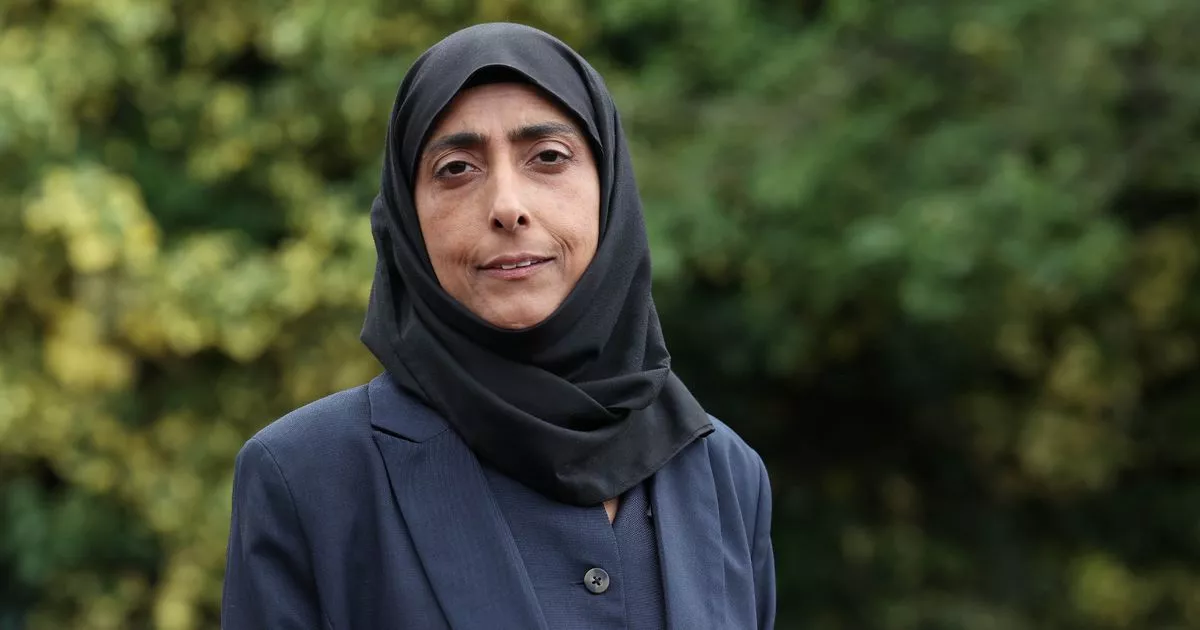The school is in one of Manchester’s most deprived neighbourhoods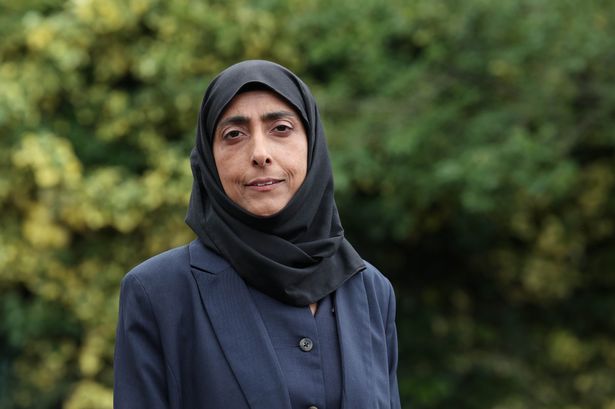 Razia Shah, headteacher at St Augustine’s CE Primary School in Monsall(Image: Jason Roberts /Manchester Evening News)
Razia Shah, headteacher at St Augustine’s CE Primary School in Monsall(Image: Jason Roberts /Manchester Evening News)
When staff noticed items were going missing from a primary school, they thought little of it.
A highlighter, some pens, a glue stick, all basic items children typically use in class. But when they discovered who was taking them and why, the reason was heartbreaking.
After some gentle questioning, headteacher Razia Shah discovered the child loved to draw but had nothing at home to use – no colouring pens, no paper, nothing.
She quickly supplied the youngster with a pencil case containing everything they’d need to get creative at home.
It’s knowing the children and community so well that Razia says makes St Augustine’s CE Primary School in Monsall, North Manchester, what it is – a safe haven from their often poverty-stricken home lives in one of Manchester’s most deprived neighbourhoods.
For the best ideas on days out, shopping and parenting issues, get the Manchester Family newsletter here
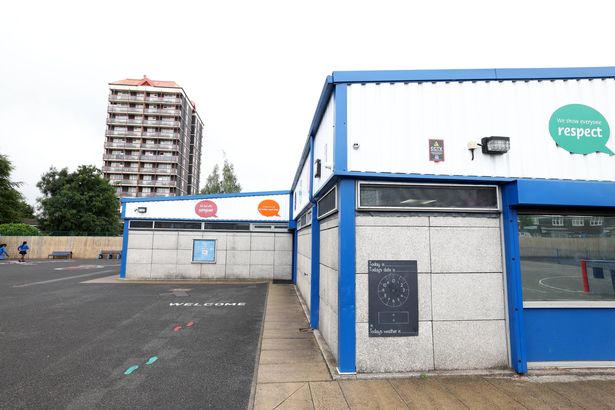 St Augustine’s is in one of Manchester’s most deprived neighbourhoods(Image: Jason Roberts /Manchester Evening News)
St Augustine’s is in one of Manchester’s most deprived neighbourhoods(Image: Jason Roberts /Manchester Evening News)
Staff see the children who have very little in their lunchboxes – ‘a very sad lunchbox with a bun, maybe a bit of rice’. They see the children’s shoes that are falling apart. They see the kids still wearing hand me down fleeces and jumpers given to older siblings when the school needed to boost ventilation during the pandemic.
But most importantly they can do something about it thanks to funding they receive through the INEOS Forgotten 40 Project, a charitable initiative hoping to improve the lives of children growing up in some of the poorest parts of the UK.
The name Forgotten 40 refers to the estimated number of children living in poverty in the UK alone, predicted to be growing towards 40%.
Headteachers of 100 primary schools serving some of the UK’s most deprived communities are given flexible funding ‘to meet the wellbeing and needs of children growing up in particularly challenging circumstances’. And to date, the project has helped over 25,000 children across the UK.
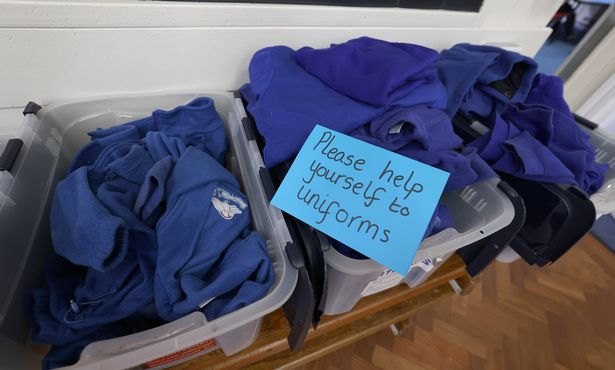 Spare uniform at the school(Image: Jason Roberts /Manchester Evening News)
Spare uniform at the school(Image: Jason Roberts /Manchester Evening News)
It’s the fourth year of funding at St Augustine’s and it’s made a huge difference to what the school has been able to do.
“If children need uniform we have uniform,” said Razia. “Quite often we’ll have soles coming off trainers and with the recent rain we replaced two pairs of school shoes for kids whose feet were getting soaked.
“If a pupil comes in and their trousers are ripped or their tights are ripped, no questions are asked, someone will say ‘just try these on’ and nobody needs to know, it’s all done discreetly. There’s no stigma attached to anything here and our parents know that.”
With 65% pupil premium children at the school, making them eligible for free school meals, the needs of many of them are obvious, says Razia. But it’s not only those on benefits that are in need of support.
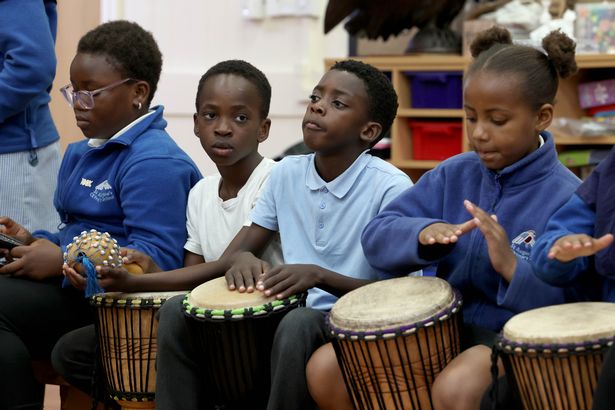 Pupils enjoying a music session at St Augustine’s(Image: Jason Roberts /Manchester Evening News)
Pupils enjoying a music session at St Augustine’s(Image: Jason Roberts /Manchester Evening News)
“We have parents who are working so bloody hard,” she said. “We have working poor parents who are one-in, one-out at home with their shifts just to make ends meet and doing everything they possibly can.
“What you notice about so many is there’s a pride element – the children are immaculate and presented so clean in their uniform everyday, unless you’re aware of that family, you would have no idea what they don’t have.
“Unless you have invested the time, you wouldn’t know what sacrifices are being made, maybe that parents have come to this country to improve the life chances of their kids and are doing all they can.”
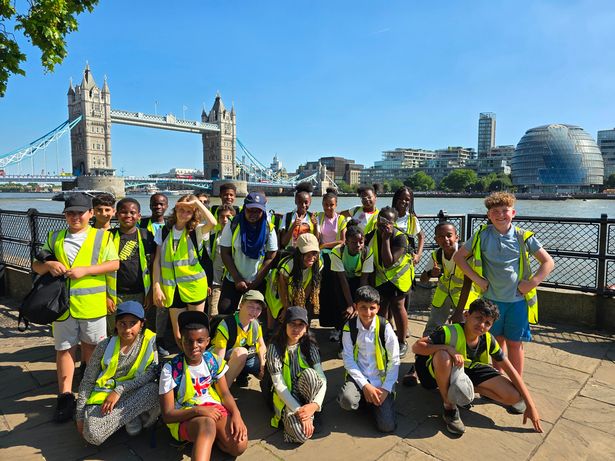 St Augustine’s CE Primary School pupils enjoying one of their trips funded through the INEOS Forgotten 40 Project(Image: St Augustine’s CE Primary School)
St Augustine’s CE Primary School pupils enjoying one of their trips funded through the INEOS Forgotten 40 Project(Image: St Augustine’s CE Primary School)
The pupils aren’t just pupils here. Referring to them as ‘my babies’ Razia believes it’s her role, the school’s role, to give them what their families can’t. That means, as well as helping with basics – everyone gets a free breakfast, free fruit at break and free milk with lunch – they provide experiences for them too.
It can be smaller things like the child who sits with Razia every Friday to enjoy fish and chips for lunch when their parents can’t afford school dinners. And it’s the bigger things too, like the annual cinema trip, theatre and farm visits and trips to London.
“We try to give them as many trips and first-hand experiences as possible,” said Razia, herself a mum-of-three.
“As a headteacher we are gifted this money from INEOS to use on our community, no strings attached, to do whatever our community needs.
“My parents love their children and want to give their children the best, but life is hard and they can’t always afford not only the luxuries but the basics, so we want to help them as much as we can.
“The hire of a coach alone can be £400 and with the funding it means we never have to worry about whether our parents can afford that.”
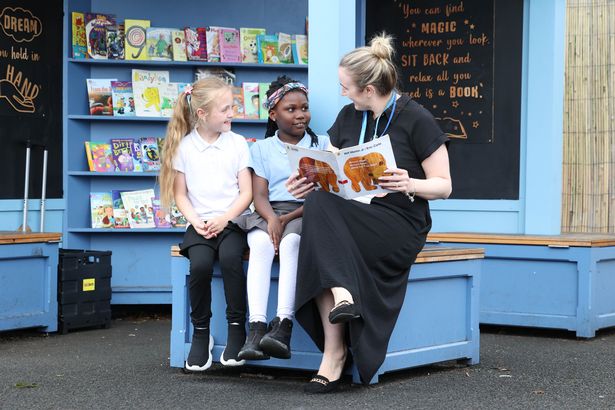 Pupils enjoy a story at the Monsall school (Image: Jason Roberts /Manchester Evening News)
Pupils enjoy a story at the Monsall school (Image: Jason Roberts /Manchester Evening News)
Every year the school takes 40 children on a residential trip to the Lake District, giving them ‘an amazing experience’ to remember, says Razia.
“We go in the winter when it’s cheaper,” she said. “But we layer up and the kids have the best time and it’s totally free.
“What we try to do is give our children everything they haven’t got. We don’t have a park in Monsall, there are two pubs but no park. There’s no doctor’s surgery, no shop. It’s like an island on its own and gets forgotten about.
“Children don’t get the opportunity to do these things unless school provides them, it’s not because parents don’t want to.”
Join our Family WhatsApp group HERE
The school itself is surrounded by high rise flats and there’s little greenery. Which is why they’ve created an orchard in the grounds, a place where the kids can grow potatoes and pick fruit from the trees. There’s a purpose built track where kids can run or walk the Daily Mile.
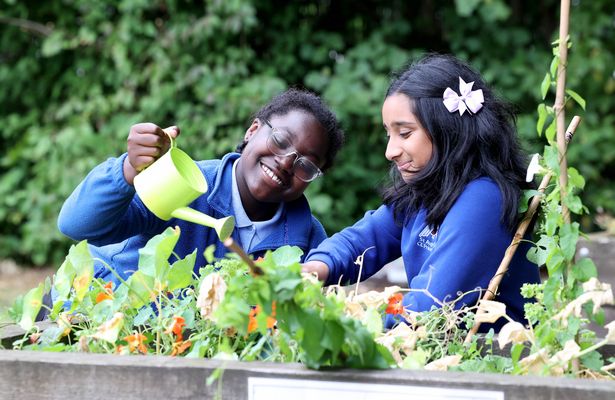 Pupils in the orchard behind the school (Image: Jason Roberts /Manchester Evening News)
Pupils in the orchard behind the school (Image: Jason Roberts /Manchester Evening News)
“Someone has got to fight their corner and make sure that the M40 postcode doesn’t determine their life chances,” said the head.
“I always say they are my babies and if we don’t cheerlead for them then nobody will.”
Funding for St Augustine’s has been confirmed for the next three years, but Razia is already dreading what will happen when it ends.
“It makes such a difference having the autonomy with this money,” she said. “It means if I need to I can help someone top up their electricity, I can pay for things they need, I can think outside the box.
“We know our communities well and the children who need support. We wear so many hats now – social worker, health carer – we do so many things.
“I just wish these next three years would never end because we’ve been able to make such a difference and that’s what we all come into the job for.
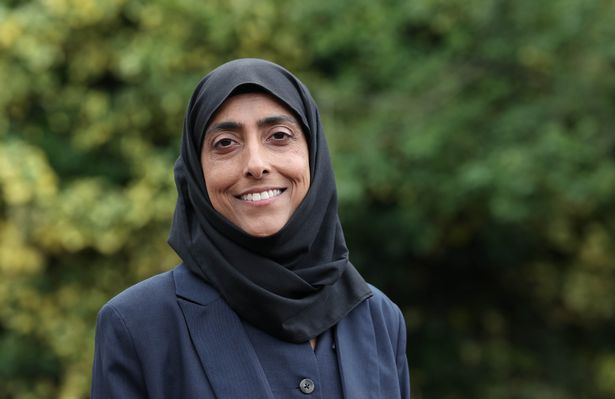 Headteacher Razia Shah is already worried what will happen when the funding ends (Image: Jason Roberts /Manchester Evening News)
Headteacher Razia Shah is already worried what will happen when the funding ends (Image: Jason Roberts /Manchester Evening News)
INEOS is a global chemical company comprising 36 businesses with 194 sites in 29 countries throughout the world. INEOS also encompasses consumer brands and sports interests, as well as a number of charitable and philanthropic projects.
The INEOS Forgotten 40 Project began in 2020 when INEOS Chairman Sir Jim Ratcliffe read reports of growing childhood poverty and looked to do something pivotal to increase opportunities for all children.
The project was born out of a need to work with primary schools, to reach children at a young age, in the environment where they are almost every day.
Money goes direct to schools, with no middleman and there’s minimal unnecessary admin required by headteachers.
To find out more, visit the website.
